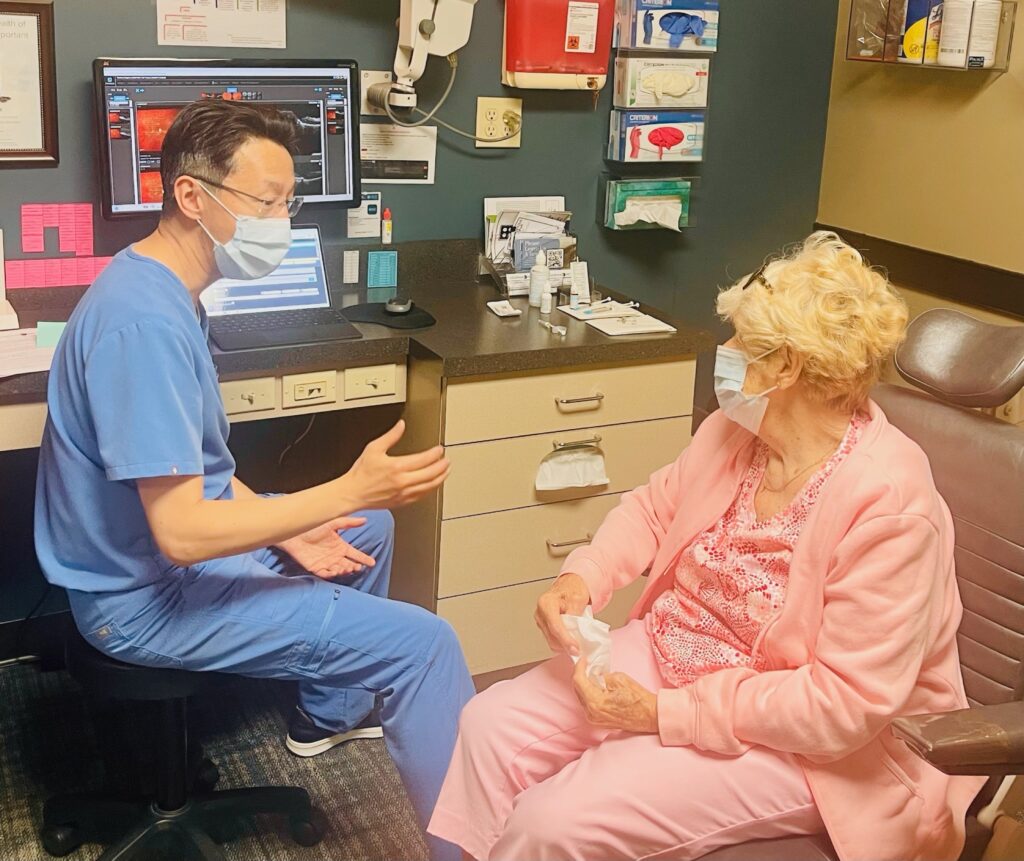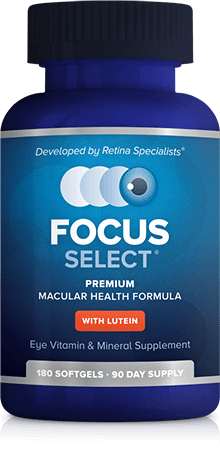What is Age-Related Macular Degeneration (AMD)?
AMD is an eye condition associated with aging that gradually destroys sharp, central vision. Central vision is needed for seeing objects clearly and for common daily tasks such as reading and driving. AMD affects the macula, the part of the eye that allows you to see fine detail. In some cases, AMD advances so slowly that people notice little change in their vision. In others, the eye condition progresses faster and may lead to a loss of vision in both eyes. Macular degeneration is a leading cause of vision loss in Americans 60 years of age and older.
The greatest risk factor for macular degeneration is age. However, other risk factors include smoking, obesity, family history, gender (women are more at risk than men), and race (Caucasians are more likely to develop the condition than African Americans). There are two types of macular degeneration: wet and dry.
Wet Macular Degeneration
Wet macular degeneration occurs when abnormal blood vessels behind the retina start growing under the macula. These new blood vessels are often very fragile and may leak blood and fluid. The blood and fluid raise the macula from its normal place at the back of the eye, causing rapid damage to the macula. With wet AMD, loss of central vision can occur quickly.
An early symptom of wet AMD is that straight lines appear wavy. If you notice this condition or other changes to your vision, contact your eye doctor immediately to schedule a comprehensive dilated eye exam.
New Treatments for Wet Macular Degeneration
Dry Macular Degeneration
Dry macular degeneration occurs when the light-sensitive cells in the macula slowly break down, gradually blurring central vision in the affected eye. As dry AMD gets worse, you may see a blurred spot in the center of your vision. Over time, as the macula loses its ability to function, central vision starts to blur and eventually is lost all together.
The most common symptom of dry AMD is slightly blurred vision. You may have difficulty recognizing faces. You may need more light for reading and other tasks. Dry AMD generally affects both eyes, but vision can be lost in one eye while the other eye is unaffected. One of the most common early findings of dry AMD is drusen.
Drusen are yellow deposits under the retina. They often are found in people over age 60. Your retina specialist can detect drusen during a comprehensive dilated eye exam. The dry form of AMD can advance and cause vision loss without turning into wet AMD. Dry AMD also can suddenly turn into wet AMD, even during its early stages. Certain risk factors can help suggest if a conversion to wet AMD may occur but there is no way to predict with certainty if or when it would happen. Regular screening is recommended and can catch any such change in its early stage.
Dry macular degeneration in its most advanced stages can lead to formation of geographic atrophy. There are areas that have lost nearly all visual function and present as blind spots in your vision. These spots can grow and if they reach the very center of vision, they can be debilitating.

Therapy and Treatment
Wet AMD is often treated with injection of medication into the eye. These injections are medications that inhibit vascular endothelial growth factor (VEGF), which is the stimulus for the abnormal blood vessel growth. These injections are not a cure for AMD but rather a treatment option and oftentimes numerous treatments are required. The frequency of treatment varies depending on the severity of the condition. In many patients, vision can be improved or maintained with injection treatments but sometimes loss of vision may progress despite treatment. Occasionally laser treatment and photodynamic therapy are options for treatment in wet AMD.
Dry AMD and Geographic atrophy can cause vision loss that cannot be reversed. There are new treatment options available with injection of medication that may slow the progression of geographic atrophy and delay vision loss.
AREDS2 Vitamins and Supplements

The National Eye Institute’s Age-Related Eye Disease Study (AREDS) found that taking a specific high-dose formulation of antioxidants and zinc can reduces the risk of progression to wet AMD and vision loss.
Georgia Retina was one of the study centers chosen by the National Eye Institute. Many Georgia Retina patients volunteered to participate in the study.
The National Eye Institute conducted the Age-Related Eye Disease Study (AREDS) that showed that a combination of daily vitamin composed of vitamin C, vitamin E, beta-carotene, zinc, and copper can reduce the risk of advanced stages of AMD by 25%. This study also found there was a concern with the high levels of beta-carotene, putting smokers and former smokers at a higher risk for lung cancer.
The follow up AREDS 2 study showed that a revised formula consisting of the AREDS formula without beta-carotene, adding lutein and zeaxanthin reduces the risk of progression of Age-Related Macular Degeneration by an additional eighteen percent.
The formulation of AREDS 2 vitamins include Vitamin C 500 mg, Vitamin E 400 IU, Lutein 10 mg, Zeaxanthin 2mg, Zinc Oxide 25 mg, Copper (as cupric oxide) 2 mg.
There are many brands that offer this formulation of vitamin. You can discuss vitamin regimen with your Georgia Retina doctor.
Georgia Retina offers a brand own AREDS vitamin called Focus MaculaPro. Focus MaculaPro was designed by Retina. We stand by Focus MaculaPro as being high quality and priced competitively. As a convenience for you, we offer these available for purchase at your appointment or by calling our office.
In addition to vitamin supplementation, we encourage you to continue eating green leafy vegetables and a healthy balanced diet. We also encourage you to stop smoking. (If you are on Coumadin, speak to your medical doctor before eating green leafy vegetables.)
What are the Most Beneficial Types of Nutritional Supplements?
The formulation used in the study was:
What Should I Do?
If you have AMD and are taking some type of nutritional supplements, continue that regimen. We will inform you at your follow-up visit if you should continue that exact regimen or whether you should make some modifications.
If you have AMD and are not taking nutritional supplements but would like to, we will address that with you when you return for your follow-up retinal visit.
Georgia Retina offers its own AREDS vitamin called Focus MaculaPro, available for purchase at your appointment or by calling our office. We stand by Focus MaculaPro as being high quality and priced competitively.
Other brands of eye vitamins are available over-the-counter at most pharmacies.
Do not worry if you have not been taking these supplements. Be aware that the beneficial effects of these supplements are small and thought to occur only after taking the supplements for many years. If you delay starting them for several months, it is unlikely to be detrimental.
Is Lutein Beneficial?
Lutein, the beneficial pigment found in green leafy vegetables (parsley, spinach, kale, greens), was not addressed in this study, but other studies have suggested it has a beneficial effect. We encourage you to continue eating green leafy vegetables or take a lutein supplement. (If you are on Coumadin, speak to your medical doctor before eating green leafy vegetables.)

















